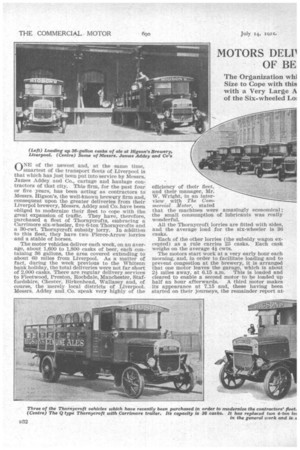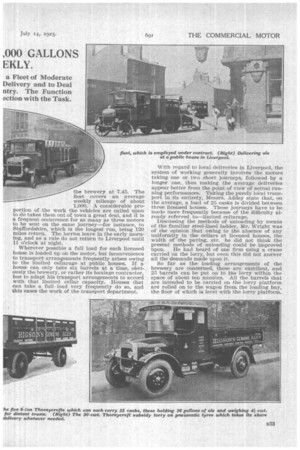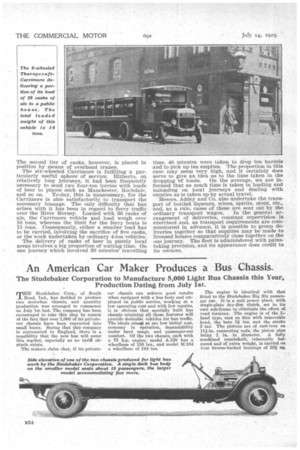MOTORS DELP ,000 GALLONS EKLY. OF BE
Page 16

Page 17

Page 18

If you've noticed an error in this article please click here to report it so we can fix it.
CINE of the newest and, at the same time, 'kJ smartest of the transport fleets of Liverpool is that which has just been put into service by Messrs. James Addey and Co., cartage and haulage contractors of that city. This firm, for the past four or five years, has been acting as contractors to Messrs. Higson's, the well-known brewery firm and, consequent upon the greater deliveries from their Liverpol brewery, Messrs. Addey and Co. have been obliged to modernize their fleet to cope with the great expansion of traffic. They have, therefore, purchased a fleet of Thornycrofts, embracing a Carrimore six-wheeler, five 6-ton Thornycrofts and a 30-cwt. Thornycroft subsidy lorry. In addition to this fleet, they have two Pierce-Arrow lorries and a stable of horses.
The motor vehicles deliver each week, on an average, about 1,600 to 1,800 casks of beer, each containing 36 gallons, the area covered extending to about 60 miles from Liverpool. As a matter of fact, during the week previous to the Whitsun bank holiday, the total deliveries were not far short a 2,000 casks. There are regular delivery services to Fleetwood, Preston, Rochdale, Manchester, Staffordshire, Chester, Birkenhead, Wallasey and, of course, the merely local districts of Liverpool. Messrs. Adcley and. Co. speak very highly of the efficiency of their fleet, and their manager, Mr.
W. Wright, in an interview with The Commercial Motor, stated that the machines were amazingly economical ; the small consumption of lubricants was really wonderful.
All the Thornycroft lorries are fitted with sides, and, the average load for the six-wheeler is 36 casks.
Each of the other lorries (the subsidy wagon excepted) as a rule carries 25 casks. Each cask weighs on the average 4 cwts.
The motors start work at a very early hour each morning, and, in order to facilitate loading and to prevent congestion at the brewery, it is arranged that one motor leaves the garage, which is about 2i miles away, at 6.15 a.m. This is loaded and cleared to enable a second motor to be loaded up half an hour afterwards. A third motor makes Its appearance at 7.15 and, these having been started on their journeys, the remainder report at, th brewery at 7.45. The fleet covers an average weekly mileage of about 1,000. A considerable pro portion of the work the vehicles are called upon to do takes them out of town a great deal, and it is a frequent occurrence for as many as three motors to be sent on the same journey—for instance, to Staffordshire, which is the longest run, being 120 miles return. The lorries leave in the early morning, and as a rule do not return to Liverpool until 11 o'clock at night.
Wherever possible a full load for each licensed house is loaded up on the motor, but inconvenience to transport arrangements frequently arises owing to the limited cellarage at public houses. If a house can only take six barrels at a time, obviously the brewery, or rather its haulage contractor, has to adapt his transport arrangements to accord with that limited cellar capacity. Houses that can take a full . load very frequently do so, and this eases the work of the transport department. With regard to local deliveries in Liverpool, the system of working generally involves the motors taking one or two short journeys, followed by a longer one, thus making the average deliveries appear better from the point of view of actual running performances. Taking the purely local transport in its entirety, Messrs. Addey state that, on the average, a load of 25 casks is divided between three licensed houses. These journeys have to be made more frequently because of the difficulty already referred to—limited cellarage.
Discussing the methods of unloading by means of the familiar steel-lined ladder, Mr. Wright was of the opinion that owing to the absence of any uniformity in the cellars at licensed houses, the width of the paving, etc. he did not think the present methods of unloading could be improved upon. He had heard of one firm using a crane carried on the lorry, but even this did not answer all the demands made upon it.
So far as the loading arrangements of the brewery are concerned, these are excellent, and 25 barrels can be put on to the lorry within the space of about ten minutes. All the barrels that are intended to be carried on the lorry platform are rolled on to the wagon from. the loading bay, the floor of which ig level with the lorry platform. The second tier of casks, however, is placed in position by means of overhead cranes. The six-wheeled Carrimore is fulfilling a particularly useful sphere of service. Hitherto, on relatively long journeys, it had been frequently necessary to send two four-ton lorries with loads of beer to places such as Manchester, Rochdale, and so on. To-day, this is unnecessary, for the Carrimore is able satisfactorily to transport the necessary tonnage. The only difficulty that has arisen with it has been in regard to ferry traffic over the River Mersey. Loaded with 36 casks of ale, the Carrimore vehicle and load weigh over 16 tons, whereas the limit for the ferry boats is 15 tons. Consequently, either a WI:taller load has to be carried, involving the sacrifice of five casks, or the work undertaken by ordinary 4-ton vehicles.
The delivery of casks of beer in purely local areas involves a big proportion of waiting time. On one journey which involved 30 minutes' travelling time, 40 minutes were taken to drop ten barrels and to pick up ten empties. The proportion in this case may seem very high, and it certainly does serve to give an idea as to the time taken in the dropping -t)f loads. On the average, we are informed that as much time is taken in loading and unloading on local journeys and dealing with empties as is taken up by actual travel. Messrs. Addey and Co. also undertake the transport of bottled liqueurs, wines, spirits, stout, etc., and, as a rule, cases of these are sent out by the ordinary transport wagon. In the general arrangement of deliveries, constant supervision is exercised and, as transport requirements are communicated in advance, it is possible to group deliveries together so that supplies may be made to licensed houses comparatively close together on the one journey. The fleet is administered with painstaking precision, and its appearance does credit to its owners.




























